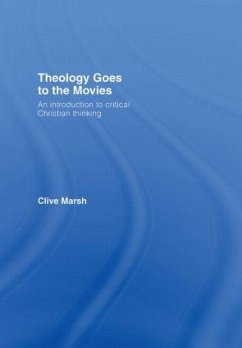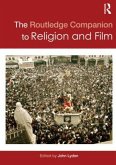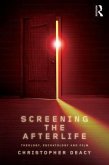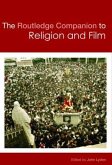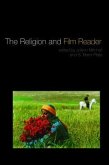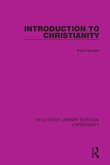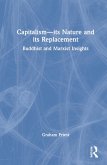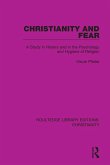Drawing a comparison between religion and cinema-going, this text examines a range of contemporary films in relation to key theological concepts. Cinema as a religion-like activity is explored through cognitive, affective, aesthetic and ethical levels, identifying the religious aspects in the social practice of cinema-going. Written by a leading expert in the field, Theology Goes to the Movies analyzes: * the role of cinema and Church in Western culture * the power of Christian symbols and images within popular culture * theological concepts of humanity, evil and redemption, eschatology and God. This is an ideal text for students seeking a new way into the study of theology.
Hinweis: Dieser Artikel kann nur an eine deutsche Lieferadresse ausgeliefert werden.
Hinweis: Dieser Artikel kann nur an eine deutsche Lieferadresse ausgeliefert werden.
By starting from issues explored in particular films, the book helps to ground theological debates in relation to human questions and experience. This really helps to bring the discipline of theology alive, and I wish this book had been available when I was a theology student.
Gordon Lynch, Senior Lecturer in Religion and Culture, University of Birmingham, UK
Marsh is correct! Theology is not just cognitive, but affective, aesthetic and ethical. And film has become a primary resource. Here is a helpful work-book for culturally-savy theology students and theologically-interested film-lovers.
Robert K. Johnston, author of Reel Spirituality: Theology and Film in Dialogue
Marsh never reduces the theological analysis of culture to an imposition of theological concepts onto culture; rather, theology is developed in critical engagement with popular culture, within "peaceful mutual critique." He accomplishes this task with clarity, open-mindedness, and grace.
John Lyden, Professor and Chair of Religion, Dana College
In this thought-provoking book, one of the leading scholars in this rapidly growing area of study provides an imaginative series of connections between theology and film. Taking seriously the multiple backgrounds and contexts of the viewer, Marsh skilfully shows how films can open many windows onto profound theological questions and themes. He outlines with clarity the rich resources available for thinking creatively about the interactions between theology and the movies.
Dr Jolyon Mitchell, New College, Edinburgh University
Gordon Lynch, Senior Lecturer in Religion and Culture, University of Birmingham, UK
Marsh is correct! Theology is not just cognitive, but affective, aesthetic and ethical. And film has become a primary resource. Here is a helpful work-book for culturally-savy theology students and theologically-interested film-lovers.
Robert K. Johnston, author of Reel Spirituality: Theology and Film in Dialogue
Marsh never reduces the theological analysis of culture to an imposition of theological concepts onto culture; rather, theology is developed in critical engagement with popular culture, within "peaceful mutual critique." He accomplishes this task with clarity, open-mindedness, and grace.
John Lyden, Professor and Chair of Religion, Dana College
In this thought-provoking book, one of the leading scholars in this rapidly growing area of study provides an imaginative series of connections between theology and film. Taking seriously the multiple backgrounds and contexts of the viewer, Marsh skilfully shows how films can open many windows onto profound theological questions and themes. He outlines with clarity the rich resources available for thinking creatively about the interactions between theology and the movies.
Dr Jolyon Mitchell, New College, Edinburgh University
By starting from issues explored in particular films, the book helps to ground theological debates in relation to human questions and experience. This really helps to bring the discipline of theology alive, and I wish this book had been available when I was a theology student.
Gordon Lynch, Senior Lecturer in Religion and Culture, University of Birmingham, UK
Marsh is correct! Theology is not just cognitive, but affective, aesthetic and ethical. And film has become a primary resource. Here is a helpful work-book for culturally-savy theology students and theologically-interested film-lovers.
Robert K. Johnston, author of Reel Spirituality: Theology and Film in Dialogue
Marsh never reduces the theological analysis of culture to an imposition of theological concepts onto culture; rather, theology is developed in critical engagement with popular culture, within "peaceful mutual critique." He accomplishes this task with clarity, open-mindedness, andgrace.
John Lyden, Professor and Chair of Religion, Dana College
In this thought-provoking book, one of the leading scholars in this rapidly growing area of study provides an imaginative series of connections between theology and film. Taking seriously the multiple backgrounds and contexts of the viewer, Marsh skilfully shows how films can open many windows onto profound theological questions and themes. He outlines with clarity the rich resources available for thinking creatively about the interactions between theology and the movies.
Dr Jolyon Mitchell, New College, Edinburgh University
Gordon Lynch, Senior Lecturer in Religion and Culture, University of Birmingham, UK
Marsh is correct! Theology is not just cognitive, but affective, aesthetic and ethical. And film has become a primary resource. Here is a helpful work-book for culturally-savy theology students and theologically-interested film-lovers.
Robert K. Johnston, author of Reel Spirituality: Theology and Film in Dialogue
Marsh never reduces the theological analysis of culture to an imposition of theological concepts onto culture; rather, theology is developed in critical engagement with popular culture, within "peaceful mutual critique." He accomplishes this task with clarity, open-mindedness, andgrace.
John Lyden, Professor and Chair of Religion, Dana College
In this thought-provoking book, one of the leading scholars in this rapidly growing area of study provides an imaginative series of connections between theology and film. Taking seriously the multiple backgrounds and contexts of the viewer, Marsh skilfully shows how films can open many windows onto profound theological questions and themes. He outlines with clarity the rich resources available for thinking creatively about the interactions between theology and the movies.
Dr Jolyon Mitchell, New College, Edinburgh University

